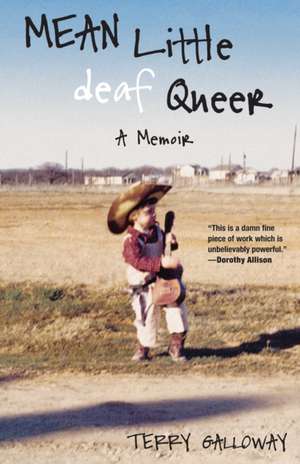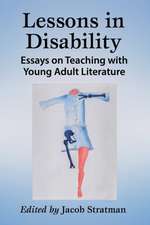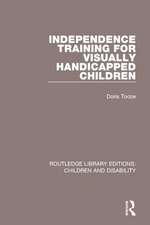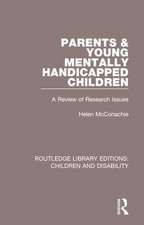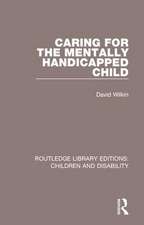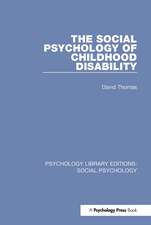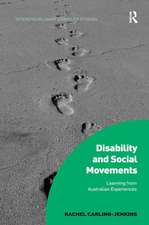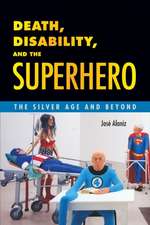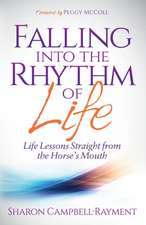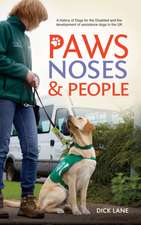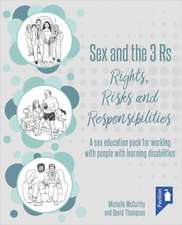Mean Little Deaf Queer
Autor Terry Gallowayen Limba Engleză Paperback – 31 mai 2010
Vezi toate premiile Carte premiată
Lambda Literary Awards (2009)
Preț: 114.07 lei
Nou
Puncte Express: 171
Preț estimativ în valută:
21.83€ • 22.55$ • 18.17£
21.83€ • 22.55$ • 18.17£
Carte disponibilă
Livrare economică 04-18 martie
Preluare comenzi: 021 569.72.76
Specificații
ISBN-13: 9780807073315
ISBN-10: 0807073318
Pagini: 230
Dimensiuni: 139 x 208 x 18 mm
Greutate: 0.32 kg
Editura: Beacon Press (MA)
ISBN-10: 0807073318
Pagini: 230
Dimensiuni: 139 x 208 x 18 mm
Greutate: 0.32 kg
Editura: Beacon Press (MA)
Recenzii
This is a damn fine piece of work which is unbelievably powerful.—Dorothy Allison
"This is not your mother's triumph-of-the-human-spirit memoir. Yes, Terry Galloway is resilient. But she's also caustic, depraved, utterly disinhibited, and somehow sweetly bubbly, a beguiling raconteuse who periodically leaps onto the dinner table and stabs you with her fork. Her story will fascinate, it will hurt, and you will like it."—Alison Bechdel, author of Fun Home
"The most uncomfortable laughter of the season."—Out
"One of the finest, most nakedly honest and humorous autobiographies out there to be read. . . . Partly David Sedaris-esque in its slice-of-life essay moments, part slapstick farce, so very real, and always laugh out loud hilarious."—Rebecca Sarwate, Edge
"[A] humorous and harrowing new memoir."—The Advocate
"Told with understandable rage, quirky humor, and extraordinary humanity, this remarkable woman's engaging account deserves a large readership."—Booklist
"A frank, bitingly humorous memoir."—Kirkus Reviews
"[Galloway] is dexterous in her use of words and devastating with a sense of black humor that brings numerous laugh-out-loud delights."—John R. Killacky, The Gay and Lesbian Review
"Galloway was born a storyteller, and her narrative gifts are in full force throughout, spinning yarns about herself and her family that mesmerize."—Robert Faires, Austin Chronicle
"This is not your mother's triumph-of-the-human-spirit memoir. Yes, Terry Galloway is resilient. But she's also caustic, depraved, utterly disinhibited, and somehow sweetly bubbly, a beguiling raconteuse who periodically leaps onto the dinner table and stabs you with her fork. Her story will fascinate, it will hurt, and you will like it."—Alison Bechdel, author of Fun Home
"The most uncomfortable laughter of the season."—Out
"One of the finest, most nakedly honest and humorous autobiographies out there to be read. . . . Partly David Sedaris-esque in its slice-of-life essay moments, part slapstick farce, so very real, and always laugh out loud hilarious."—Rebecca Sarwate, Edge
"[A] humorous and harrowing new memoir."—The Advocate
"Told with understandable rage, quirky humor, and extraordinary humanity, this remarkable woman's engaging account deserves a large readership."—Booklist
"A frank, bitingly humorous memoir."—Kirkus Reviews
"[Galloway] is dexterous in her use of words and devastating with a sense of black humor that brings numerous laugh-out-loud delights."—John R. Killacky, The Gay and Lesbian Review
"Galloway was born a storyteller, and her narrative gifts are in full force throughout, spinning yarns about herself and her family that mesmerize."—Robert Faires, Austin Chronicle
Notă biografică
Terry Galloway is the founder of the Actual Lives writing and performance programs; a founding member of Esther’s Follies, Austin, Texas’s legendary cabaret; and cofounder of the Mickee Faust Club in Tallahassee, Florida. She divides her time between Austin and Tallahassee.
Extras
The year I turned nine, months before anyone knew I
was going deaf, the voices of everyone I loved had all but disappeared.
Their chatter had been like the nattering of birds
in the trees—a cheerful if sometimes annoying reminder of
how alive the world was around me. As their voices lapsed
away, I no longer felt sure how any but the most common
words sounded, how they ought to be pronounced, and
that made me uneasy about opening my mouth. My place
in the family that year was to watch, which was how I was
learning to listen. I’d sit at the kitchen table—where most
stories of any importance were told—and read lips, piecing
together the shapes they formed until they made a kind
of sense. Lip reading—whether you know you’re doing it
or not—is a hard, intimate business, and during my ninth
year, when the way people sucked or licked their teeth as
they were talking took sneaking precedence over the look
in their eyes, all that rapt staring at mouths would wring
me dry. After every couple of stories, I’d turn my gaze
away, give myself a breather, and recharge. It took me so
much concentrated effort to make sense, much less sentences,
out of the lips as they moved, that any and every
utterance had to have a payoff. If people were making idle
conversation or empty yak about, say, grocery shopping or
getting their nails done, I’d heave the sigh of the doomed
and lean my head against the table, pressing the bridge of
my nose against the metal rim hard enough to dig a furrow.
I’d glance up every now and then to see if the topic
had changed to something more interesting, like who had
died and what had killed them. If talk was stalled at yellow
versus white onions or the rising price of a pedicure,
I’d get to pitying myself, slaving like a dung beetle over a
worthless bit of nothing, and give up—put my head back
down on the table, close my eyes, and deliberately lose
control. The rising, falling mumble of those incomprehensible
voices would wash over me until sounds would inexplicably
leap from the muttering to shake themselves clear
in my mind as words. A name, the time of night, the make
of a car, a part of town, a tired old cliché. I’d string them
together as randomly as I caught them, but they still always
seemed to be telling me a story. Ruby, two a.m., Ford, east
of Hutto, dying of hunger, and I’d see the black-eyed Great-
Aunt Ruby I’d never met gunning her Mustang down the
one main street of a hick Texas town en route to love or a
Burger King. It soothed my hurt and anger to imagine all
those arbitrary words telling me the illicit secrets behind
everything I hadn’t heard.
Which may be why I now find myself enamored of the
memoir. The good ones thrill me every bit as much as the
great novels, but it’s the crappy ones I’ve lost my heart to.
They make me feel like a rescue dog, sniffing out the dim
glimmerings of feelings sincere and raw within a tangled
wreckage of inchoate ramblings and obvious lies. I’ve been
reading a ton of bad ones lately, most of which I’ve gotten
only halfway through. They are piled up by my bedside and
not in the best of shape. I’m a passionate reader and the
books have suffered for it, their covers wavy from having
been dropped in the tub, spines busted from being tossed
on the floor, pages folded, creased, coffee-stained, and
marked with ink. Red. I feel intensely fond of the whole
lot of lousy writing that has found its way to print because
I smell in those stinkers a fecund democracy. Every sort
of half-coherent loser getting their say. Maybe even mean
little deaf queers like me.
As a toddler I was an ardent chatterbox, with such an
adult and rapid-fire vocabulary that one of our German
neighbors in Stuttgart mistook me for a dwarf. By age seven
I was becoming what passes in our family of energetic talkers
as taciturn, more like my father, who would sneak away
from the kitchen table in the middle of a detailed piece of
family gossip my mother and my sister, Trudy, were sharing
and flee to the bathroom so he could read the Sunday
paper in peace. I never left the table. I just stopped talking.
My mother and Trudy never worried about my growing
silence—they’d taken it as appreciative. But then they
didn’t know the reasons behind it. Sounds had started disappearing
all around me. I didn’t know where to, and I
didn’t think to ask—not then and not the handful of years
later when I started having my “visions.” Or so I liked to
call them, although they never clued me in to anything
useful or remotely prophetic.
Whatever they were, they were first visited upon me
when I was nine and our family had resettled from Berlin,
Germany, to Fort Hood, Texas. One hot spring Texas
night I was sprawled on the dry grass of our new front
yard, gazing up at a spiral of stars, when I suddenly found
myself six feet in the air, looking down at myself lying on
the grass looking up at those stars. I was a little pissed off
by how perfectly cheerful my body seemed without me.
These odd displacements weren’t exactly a daily occurrence,
but that year, they happened often enough to make
themselves familiar. Once I went zooming to the ceiling of
the school gym as if sucked up by a vacuum. I dangled there
looking down on a scene that was small as a dollhouse, everything
normal about it. My PE teacher blew herself red
on her whistle while my six classmates and I, all of us looking
a bit zaftig in our blue shorts and white snap blouses,
thundered across the polished wooden floor. No one else
seemed aware that while my body was stampeding along
with the rest of the herd, I wasn’t there at all. I’d become
a much more delicate presence adrift in the rafters, smiling
down on our sweaty race as if it were a mildly amusing
bit of low comedy. Decades later in London, where
I’d gone to perform one of my one-woman shows, I saw
something of the same kind of life in miniature in a pennymechanical
shop. A carved wooden man, not much bigger
than my own thumb, was sleeping on a perfectly detailed
cloth and wooden bed inside his tiny bedroom. He slept
there until I dropped in a coin that clicked the switch that
set it all in motion. With a ticking noise, the window of his
minuscule room flew open and a dream horse, its nostrils
and eyes painted to look as wild and flaring as its mane,
poked its head through the gap. Up the little man sat, his
closed doll eyes snapping wide with alarm as the horse
reared and the wooden chair at the foot of the bed tilted
and twirled. Watching that nightmare unfold in the little
man’s shoebox of a room awakened in me the same queasy
prickle of enchantment I’d felt as a kid, looking down on a
play-pretend world.
was going deaf, the voices of everyone I loved had all but disappeared.
Their chatter had been like the nattering of birds
in the trees—a cheerful if sometimes annoying reminder of
how alive the world was around me. As their voices lapsed
away, I no longer felt sure how any but the most common
words sounded, how they ought to be pronounced, and
that made me uneasy about opening my mouth. My place
in the family that year was to watch, which was how I was
learning to listen. I’d sit at the kitchen table—where most
stories of any importance were told—and read lips, piecing
together the shapes they formed until they made a kind
of sense. Lip reading—whether you know you’re doing it
or not—is a hard, intimate business, and during my ninth
year, when the way people sucked or licked their teeth as
they were talking took sneaking precedence over the look
in their eyes, all that rapt staring at mouths would wring
me dry. After every couple of stories, I’d turn my gaze
away, give myself a breather, and recharge. It took me so
much concentrated effort to make sense, much less sentences,
out of the lips as they moved, that any and every
utterance had to have a payoff. If people were making idle
conversation or empty yak about, say, grocery shopping or
getting their nails done, I’d heave the sigh of the doomed
and lean my head against the table, pressing the bridge of
my nose against the metal rim hard enough to dig a furrow.
I’d glance up every now and then to see if the topic
had changed to something more interesting, like who had
died and what had killed them. If talk was stalled at yellow
versus white onions or the rising price of a pedicure,
I’d get to pitying myself, slaving like a dung beetle over a
worthless bit of nothing, and give up—put my head back
down on the table, close my eyes, and deliberately lose
control. The rising, falling mumble of those incomprehensible
voices would wash over me until sounds would inexplicably
leap from the muttering to shake themselves clear
in my mind as words. A name, the time of night, the make
of a car, a part of town, a tired old cliché. I’d string them
together as randomly as I caught them, but they still always
seemed to be telling me a story. Ruby, two a.m., Ford, east
of Hutto, dying of hunger, and I’d see the black-eyed Great-
Aunt Ruby I’d never met gunning her Mustang down the
one main street of a hick Texas town en route to love or a
Burger King. It soothed my hurt and anger to imagine all
those arbitrary words telling me the illicit secrets behind
everything I hadn’t heard.
Which may be why I now find myself enamored of the
memoir. The good ones thrill me every bit as much as the
great novels, but it’s the crappy ones I’ve lost my heart to.
They make me feel like a rescue dog, sniffing out the dim
glimmerings of feelings sincere and raw within a tangled
wreckage of inchoate ramblings and obvious lies. I’ve been
reading a ton of bad ones lately, most of which I’ve gotten
only halfway through. They are piled up by my bedside and
not in the best of shape. I’m a passionate reader and the
books have suffered for it, their covers wavy from having
been dropped in the tub, spines busted from being tossed
on the floor, pages folded, creased, coffee-stained, and
marked with ink. Red. I feel intensely fond of the whole
lot of lousy writing that has found its way to print because
I smell in those stinkers a fecund democracy. Every sort
of half-coherent loser getting their say. Maybe even mean
little deaf queers like me.
As a toddler I was an ardent chatterbox, with such an
adult and rapid-fire vocabulary that one of our German
neighbors in Stuttgart mistook me for a dwarf. By age seven
I was becoming what passes in our family of energetic talkers
as taciturn, more like my father, who would sneak away
from the kitchen table in the middle of a detailed piece of
family gossip my mother and my sister, Trudy, were sharing
and flee to the bathroom so he could read the Sunday
paper in peace. I never left the table. I just stopped talking.
My mother and Trudy never worried about my growing
silence—they’d taken it as appreciative. But then they
didn’t know the reasons behind it. Sounds had started disappearing
all around me. I didn’t know where to, and I
didn’t think to ask—not then and not the handful of years
later when I started having my “visions.” Or so I liked to
call them, although they never clued me in to anything
useful or remotely prophetic.
Whatever they were, they were first visited upon me
when I was nine and our family had resettled from Berlin,
Germany, to Fort Hood, Texas. One hot spring Texas
night I was sprawled on the dry grass of our new front
yard, gazing up at a spiral of stars, when I suddenly found
myself six feet in the air, looking down at myself lying on
the grass looking up at those stars. I was a little pissed off
by how perfectly cheerful my body seemed without me.
These odd displacements weren’t exactly a daily occurrence,
but that year, they happened often enough to make
themselves familiar. Once I went zooming to the ceiling of
the school gym as if sucked up by a vacuum. I dangled there
looking down on a scene that was small as a dollhouse, everything
normal about it. My PE teacher blew herself red
on her whistle while my six classmates and I, all of us looking
a bit zaftig in our blue shorts and white snap blouses,
thundered across the polished wooden floor. No one else
seemed aware that while my body was stampeding along
with the rest of the herd, I wasn’t there at all. I’d become
a much more delicate presence adrift in the rafters, smiling
down on our sweaty race as if it were a mildly amusing
bit of low comedy. Decades later in London, where
I’d gone to perform one of my one-woman shows, I saw
something of the same kind of life in miniature in a pennymechanical
shop. A carved wooden man, not much bigger
than my own thumb, was sleeping on a perfectly detailed
cloth and wooden bed inside his tiny bedroom. He slept
there until I dropped in a coin that clicked the switch that
set it all in motion. With a ticking noise, the window of his
minuscule room flew open and a dream horse, its nostrils
and eyes painted to look as wild and flaring as its mane,
poked its head through the gap. Up the little man sat, his
closed doll eyes snapping wide with alarm as the horse
reared and the wooden chair at the foot of the bed tilted
and twirled. Watching that nightmare unfold in the little
man’s shoebox of a room awakened in me the same queasy
prickle of enchantment I’d felt as a kid, looking down on a
play-pretend world.
Cuprins
Prologue: Nine
Part I: Drowning
Them and Me
Visions
Presto Change-o
Meaner
The Performance of Drowning
Lost Boy
Part II : Passing
Little-d Deaf
On Being Told No
Passing Strange
Drag Acts
Shhhhhh!
Jobs for the Deaf
The Shallow End
Part III : Emerging
Scare
Who Died and What Killed Them
Why I Should Matter
Epilogue: A Happy Life . . .
Part I: Drowning
Them and Me
Visions
Presto Change-o
Meaner
The Performance of Drowning
Lost Boy
Part II : Passing
Little-d Deaf
On Being Told No
Passing Strange
Drag Acts
Shhhhhh!
Jobs for the Deaf
The Shallow End
Part III : Emerging
Scare
Who Died and What Killed Them
Why I Should Matter
Epilogue: A Happy Life . . .
Descriere
When Galloway was born, no one knew that an experimental antibiotic given to her mother had wreaked havoc on the fetus's nervous system. With disarming candor, the author writes about her breakdowns, her queer identity, and living in a silent world populated by unforgettable characters.
Premii
- Lambda Literary Awards Finalist, 2009
